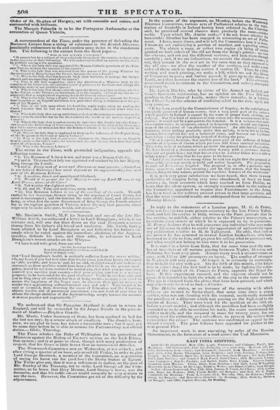In reply to the statements of a London paper, M.
G. de Perrey,
W110
was twetity-two years private secretary to the late Prince Talley- rand, and left his service in 1826, writes to the Paris joureals that he has moiling to publish, either relative to the Prince's manuscripts, or to certein gl vat secrets of Nellie,' he is supposed to be in possession.
Perrey declares that be will prosecute any individuul who may make use of his name in order to confer the appearance of authenticity upon Hey publication relative to M. de Talleyrand. Ile adds, that such is the answer he has returned to several London booksellers, who have hastened to w :ite to him, and prcpose his selling what he possesses not, and what woulii not belong to hint were it in his possession.
It is stated in a letter from Italy, that for some time past the num-
ber of travellere of all nations pussing between Naples, Messina, and Palermo, huts been very great. Almost every week a steamer eomes or goes, with 130 or .200 passengers on board. The conflux of strangets iiiNaples is still very great. At length it is seriously in contempla- tion to bele. the city with gas. On tie :Seth of this month, (the king's fi.re or saint's day,) the first trial is to be made, by lighting the colon. node of the church of St. Francis de Paulo, opposite the Boyd Pa. litee. If this experiment succeed, and the expense hiotild eot be great. it is intended to light the whole of' the city in the same manner. l'he gas is obtained from the olives that have been pressed, und which muy afterwards be ustel us fuel.— Courier.
//e/teXii states, as tm instance of the severity with which
%dikes are treated it, Switzerland, that some time since a young soldier, Vu hut) WilS out shooting with his corporal, accidentally wounded the postilion of a diligence which was passing on the high-road in the canton of Leine. They wet e tiled for the accident on the 30th ult. before it court-Inertial ; and although the postillion had been so slightly wounded as to be able to continue his work, the court condemned the soldier to deatth, and the corporal to irons for twenty years, for not having wed his authority, as it still-oflicer, to prevent the soldier from committing the crime! The mm elitence was confirmed on appeal by the
Grand Council. The poor fellows have appealed for pardon to the next general Diet. An impottant work is now executing, by order of the Russian Government, in the formation of a road across the Ural Mountains.


























 Previous page
Previous page